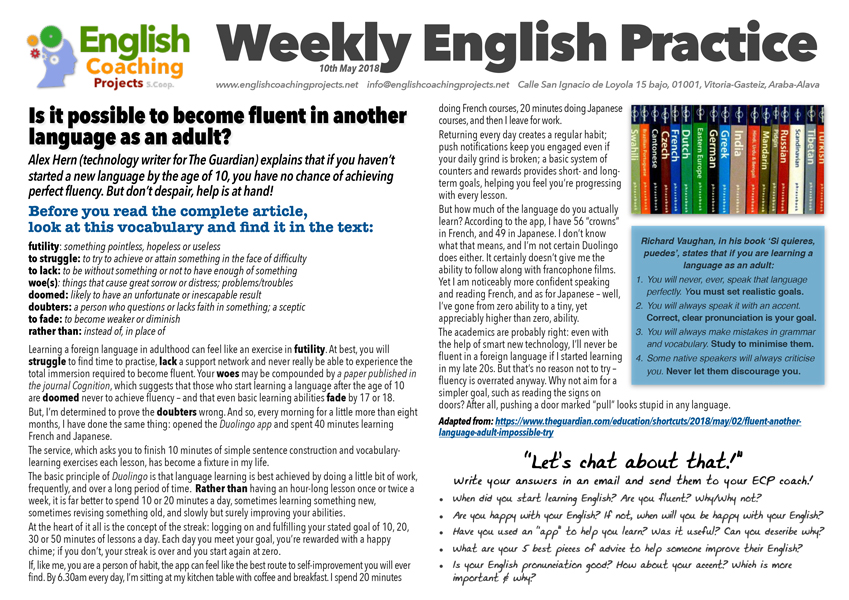Click on the image to download the pdf
Alex Hern (technology writer for The Guardian) explains that if you haven’t started a new language by the age of 10, you have no chance of achieving perfect fluency. But don’t despair, help is at hand!
Before you read the complete article, look at this vocabulary and find it in the text:
futility: something pointless, hopeless or useless
to struggle: to try to achieve or attain something in the face of difficulty
to lack: to be without something or not to have enough of something
woe(s): things that cause great sorrow or distress; problems/troubles
doomed: likely to have an unfortunate or inescapable result
doubters: a person who questions or lacks faith in something; a sceptic
to fade: to become weaker or diminish
rather than: instead of, in place of
Listen to the audio
Learning a foreign language in adulthood can feel like an exercise in futility. At best, you will struggle to find time to practise, lack a support network and never really be able to experience the total immersion required to become fluent. Your woes may be compounded by a paper published in the journal Cognition, which suggests that those who start learning a language after the age of 10 are doomed never to achieve fluency – and that even basic learning abilities fade by 17 or 18.
But, I’m determined to prove the doubters wrong. And so, every morning for a little more than eight months, I have done the same thing: opened the Duolingo app and spent 40 minutes learning French and Japanese.
The service, which asks you to finish 10 minutes of simple sentence construction and vocabulary-learning exercises each lesson, has become a fixture in my life.
The basic principle of Duolingo is that language learning is best achieved by doing a little bit of work, frequently, and over a long period of time. Rather than having an hour-long lesson once or twice a week, it is far better to spend 10 or 20 minutes a day, sometimes learning something new, sometimes revising something old, and slowly but surely improving your abilities.
At the heart of it all is the concept of the streak: logging on and fulfilling your stated goal of 10, 20, 30 or 50 minutes of lessons a day. Each day you meet your goal, you’re rewarded with a happy chime; if you don’t, your streak is over and you start again at zero.
If, like me, you are a person of habit, the app can feel like the best route to self-improvement you will ever find. By 6.30am every day, I’m sitting at my kitchen table with coffee and breakfast. I spend 20 minutes doing French courses, 20 minutes doing Japanese courses, and then I leave for work.
Returning every day creates a regular habit; push notifications keep you engaged even if your daily grind is broken; a basic system of counters and rewards provides short- and long-term goals, helping you feel you’re progressing with every lesson.
But how much of the language do you actually learn? According to the app, I have 56 “crowns” in French, and 49 in Japanese. I don’t know what that means, and I’m not certain Duolingo does either. It certainly doesn’t give me the ability to follow along with francophone films. Yet I am noticeably more confident speaking and reading French, and as for Japanese – well, I’ve gone from zero ability to a tiny, yet appreciably higher than zero, ability.
The academics are probably right: even with the help of smart new technology, I’ll never be fluent in a foreign language if I started learning in my late 20s. But that’s no reason not to try – fluency is overrated anyway. Why not aim for a simpler goal, such as reading the signs on doors? After all, pushing a door marked “pull” looks stupid in any language.
“Let’s chat about that!”
Write your answers in an email and send them to your ECP coach!
- When did you start learning English? Are you fluent? Why/Why not?
- Are you happy with your English? If not, when will you be happy with your English?
- Have you used an “app” to help you learn? Was it useful? Can you describe why?
- What are your 5 best pieces of advice to help someone improve their English?
- Is your English pronunciation good? How about your accent? Which is more important & why?
Adapted from: https://www.theguardian.com/education/shortcuts/2018/may/02/fluent-another-language-adult-impossible-try


